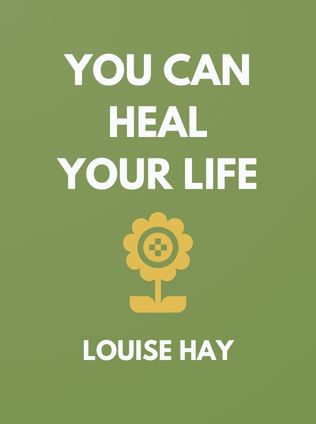
You Can Heal Your Life
By Louise Hay
Published 01/1984
About the Author
Louise Hay, the author of You Can Heal Your Life, is considered a pioneer in the modern self-help movement. Born on October 8, 1926, in Los Angeles, California, Hay had a tumultuous childhood marked by poverty, abuse, and a lack of love. These early life experiences significantly shaped her beliefs and the philosophy she would later advocate. In 1984, she published You Can Heal Your Life, which became a bestseller and made her one of the most recognized figures in self-help and motivational literature. Hay's teachings revolve around the idea that our thoughts and beliefs have a profound impact on our physical and emotional well-being. She has inspired millions with her message of self-love, forgiveness, and the power of positive affirmations.
Main Idea
The central theme of You Can Heal Your Life is that our thoughts create our reality. Louise Hay argues that negative experiences, particularly those from childhood, lead to negative beliefs that manifest in negative life experiences. She believes that by transforming our negative thoughts into positive ones, we can change our lives for the better—improving our relationships, finances, work, and even our health. Hay advocates for the use of positive affirmations, self-love, and forgiveness as key tools for achieving personal transformation and healing.
Table of Contents
- Introduction
- Where Our Problems Come From
- How to Solve Our Problems
- Specific Problem Areas: Relationships, Money, Work, Health
- Conclusion
Where Our Problems Come From
Negative Childhood Experiences
Louise Hay asserts that the root of all our problems lies in our childhood experiences. She believes that the thoughts and beliefs we absorb as children shape our entire lives. If, as children, we were told we were not good enough, we carry that belief into adulthood, and it manifests in various negative ways.
Hay’s own life serves as an example of how early negative experiences can shape one’s beliefs and, subsequently, one’s reality. Born into poverty during the Great Depression, she was subjected to abuse and neglect. These traumatic experiences led to a deep sense of unworthiness and self-hatred, which manifested in her adult life through abusive relationships and illness.
“We learn our belief systems as very little children, and then we move through life creating experiences to match our beliefs.” - Louise Hay
Negative Beliefs Create Negative Experiences
According to Hay, our beliefs act as a filter through which we view the world. These beliefs, often formed in childhood, determine the quality of our experiences. For example, if you were told repeatedly that you would never amount to anything, you may unconsciously sabotage your own success, believing deep down that you do not deserve it. This concept is reflected in Hay's own life when she realized that her abusive relationships were a manifestation of her belief that she was unworthy of love and respect.
Sign up for FREE and get access to 1,400+ books summaries.
You May Also Like
The Subtle Art of Not Giving a F*ck
A Counterintuitive Approach to Living a Good Life
By Mark MansonRich Dad Poor Dad
What the Rich Teach Their Kids About Money - That the Poor and Middle Class Do Not!
By Robert T. KiyosakiHow To Win Friends and Influence People
The All-Time Classic Manual Of People Skills
By Dale CarnegieQuiet: The Power of Introverts
The Power of Introverts in a World That Can't Stop Talking
By Susan Cain



















